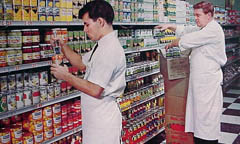 Originally published in May but given to me in a free taster issue handed out last week, the Economist has formed the view that supermarket-bashing is “elitist and muddle-headed”. Its target is the Tesco bashing where the opening of a new outlet coincides with the closure of local shops.
Originally published in May but given to me in a free taster issue handed out last week, the Economist has formed the view that supermarket-bashing is “elitist and muddle-headed”. Its target is the Tesco bashing where the opening of a new outlet coincides with the closure of local shops.
The political response from David Cameron and Ed Miliband was to “bring back the bustle to our high streets” and “people think the character of their local high street is being changed and they have no power against big corporations” respectively.
What will happen? Nothing suggests the Economist, pointing out that the Competition Commission found in 2008 that the grocery market represented a good deal for consumers.
The business magazine goes on to question how new the problem is, pointing to research from Surrey and Exeter universities that shows that as far back as 1939 chain stores and co-ops controlled half the market (up to two thirds today).
And it shows that younger, working class women welcomed supermarkets – a retired secretary interviewed by the researchers recalled asking the butcher for a tiny amount of mince. “Oh having a dinner party, madam?” he sneered. The anonymity of supermarkets can be a benefit.
But the question is one local shopkeepers could ask themselves. How inspiring are they to new shoppers? How good are they at introducing new ideas? How can you match the quality of the big supermarkets?
That last point is key. Local shops have to be better than supermarkets in order to thrive. This means you have to understand what you offer local shoppers and how you do the things you do well better than the supermarkets can. Knowing this you have to drill customer service into your team and yourself. You need to show shoppers in your store that you want to make their lives better.





Comments
This article doesn't have any comments yet, be the first!